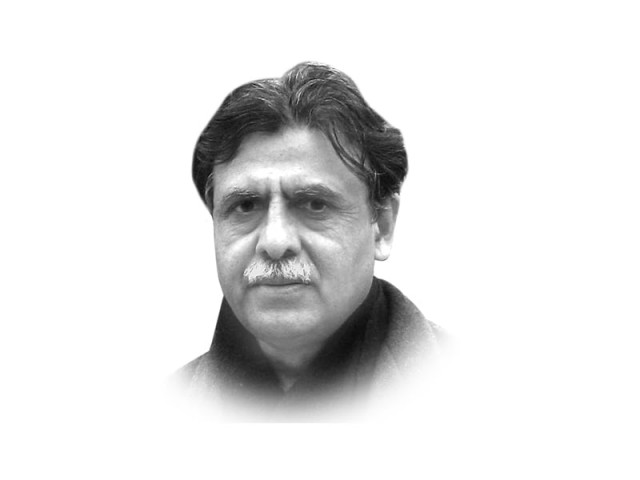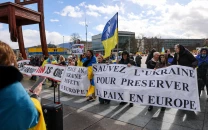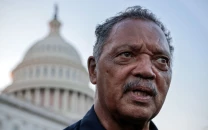US-India standoff: clash of civilisations?
It gives the impression that the government is out to give a cover to the episode and condone an act of felony.

The writer is a public policy analyst and a former federal interior secretary
What the Indian diplomat, Devyani Khobragade did was not something unusual. Diplomats from the Third World, while posted in the West on meagre salaries, do yearn for the low-cost comforts of their home countries — cooks and nannies on their toes with long working hours. How could they not indulge in this culture-bound practice — pay less to their domestic servants as if they were still living in their home country. Khobragade did not do something that was out of the blue. Her misfortune began when she was outwitted by her devious maid, who hired a legal service to drag her to court.
Mankind has known about the practice of servitude since ages. Who would know it better than the Americans, whose forefathers were the beneficiaries of services provided by black slaves brought in from the western shores of Africa? But much water has flown under the bridge since the days of ‘Uncle Tom's cabin’. Civility demands that the rule of law should reign supreme. It requires the high and the low, white and black to submit to the law; it is blind, and in the US, in many ways, blindfolded too. Leave aside the accused, even suspects cannot escape the law’s wrath. Despite the high sounding phrase of 'due process', barbed wires of the Guantanamo Bay continued to await those whom Americans deemed suspects — people whisked away from distant lands on minor suspicions and lodged in high security cells for umpteen years without a charge or a trial. They waited for a due process, which was not there.
When the issue first came to light, India should have realised how the US criminal justice system worked. The US, on its part, could not fathom the resultant Indian blowback. India is known for its embedded media and an opinionated leadership, which often misses the bigger picture and falls into reactionary mode. Khobragade had been strip-searched and arrested on the charge of a false declaration in the visa application of her maid. The application also included contents of the agreement stipulating the maid's salary. The maid claims that she was paid less than the amount declared before the US authorities. The Indian deputy counsel general is not the first person to face this kind of charge. During the last 10 years, there have been well over a hundred law suits of this category instituted in US courts.
Culture-bound practices outweigh legal considerations and diplomats from the Third World may well think of themselves as patriarchs and the ‘mai baap' of their hapless servants in alien lands; a source of emotional support for them in an environment where they are disconnected from their families. There is no master-servant relationship; instead, it is a patron-client relationship, in which the former takes care of the latter’s needs out of his meagre salary.
Khobragade, however, was not a novice. She had put in umpteen years in service and knew well about the type of visa she was applying for, and the conditions attached to it. She must have known the consequences of being caught on the wrong foot. Domestic servants are issued an A-3 visa in the US. It requires a declaration that the person for whom the visa is intended for is a servant and gets a wage which is comparable with the prevailing minimum wage in that area. The employment contract also envisages duties likely to be performed by the servant — it could be housekeeping, gardening or child care. Working hours and the weekly day off are clearly spelt out. No deduction from the domestic servant’s salary is allowed for food, shelter, medical care or travel. The payment to the servant has to be through banking channels. It is hard to believe that the diplomat, while signing these documents, was unaware of these stringent conditions. The sense of hurt felt by the lady and her well-wishers is understandable as she was arrested and strip-searched by the US Marshal Service, an executive arm of the Justice Department. While responding to the Indian tirade, a spokesperson of the Marshal Service denied that a cavity search had taken place but admitted to the occurrence of a strip search. The spokesperson has further claimed that the strip search was part of standard procedure.
The Indian government's reaction has been clumsy in some ways: removing security barriers for the US consulates and seeking intrusive details of its diplomats, which were never asked for before. It gives the impression that the government is out to give a cover to the episode and condone an act of felony. The US secretary of state has already expressed regrets over the incident, sensing the bruised Indian pride. In a phone call to the Indian security adviser, he expressed regrets and hoped that the incident will not stand in the way of the vital relationship. The Indian External Affairs Minister Salman Khurshid has urged the US government to withdraw the visa fraud case. According to him, the relationship between the two countries was far too important to disengage.
The ground reality is that the wheel of law will take its course. The diplomat is on bail, with credible documentary evidence implicating her. In view of the gridlock, it will be interesting to see how the two countries sustain the vitality of their relationship. In cases of similar nature, home countries have been giving waivers against diplomatic immunities so that the law could take its course. In this case, the Indian government, rather than exercising waiver over counsellor immunity, has found a way to circumvent the US legal process by posting the accused diplomat to the UN mission in New York. This move has been made to enable her to enjoy full diplomatic immunity and may well make the future court process meaningless. But could she get diplomatic immunity retroactively covering her past acts? The answer is no. The Vienna Convention of 1961 on the subject has underlined the procedures and protocols in this regard. Blanket immunity in the middle of proceedings in the manner India has contemplated will certainly encourage future offenders and make a joke of federal and state laws.
A frail lady, Dr Aafia Siddiqui was handed down a prison sentence of over 80 years for brandishing a gun at a US soldier at the Bagram Base. It will be interesting to see how the US Justice Department withstands the pressures and antics of the Indian government.
Published in The Express Tribune, December 31st, 2013.
Like Opinion & Editorial on Facebook, follow @ETOpEd on Twitter to receive all updates on all our daily pieces.



















COMMENTS
Comments are moderated and generally will be posted if they are on-topic and not abusive.
For more information, please see our Comments FAQ